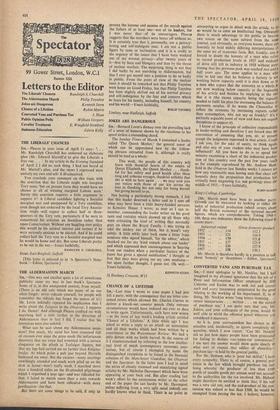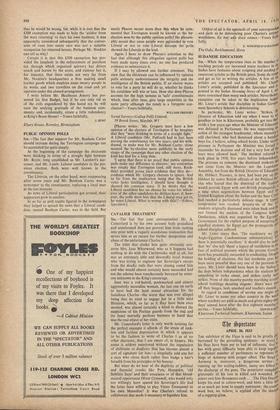CONVERTED VANS AND PURCHASE TAX
SIR,-1 must apologise to Mr. Nockles, but I had imagined in my abysmal ignorance that the job of a Press and Information Officer employed by HM Customs and Excise was to seek out and correct each and every inaccuracy perpetrated by the press relating to the working of his department. If, in so doing, Mr. Nockles wrote 'long letters itemising . . • minor inaccuracies . . . written . . . on the subject of purchase tax,' I am quite sure that you, Mr• Editor, and your colleagues of the press, would be well able to wield the editorial pencil wherever yo0 considered it necessary.
As it is, your correspondent has chosen to be selective and, incidentally, to ignore completely my question, which I now repeat : Can Mr. Nocklcs tell us just how many people have been prosecuted for failing to declare van/estate-car conversions?' I am sure the answer would show quite clearly in what sort of respect that edifice of absurdity---' purchase tax—is held by the general public.
For Mr. Hobson, who is 'poor but skilful,' I have every sympathy. There is, of course, a general pro- vision in the law which brought purchase tax into being whereby the producer of less than £500 worth of taxable goods per annum need not account to the authorities for the tax involved. Mr. Hobson might therefore be entitled to think that, if his van was a very old one, and the end-product of his con• version was valued at less than £500, he would be exempted from paying the tax. I believe, however,
that he would be wrong, for, while it is true that the £500 exemption was made to help the 'soldier from the wars returning' to kart his own' busineds, it was apparently considered subsequently that the conver- sion of vans into estate cars was not a suitable occupation for returned. heroes- Perhaps Mr. Nockles can tell us why?
Certain it is that this £500 exemption has pro- vided the loophole in the enforcement of purchase tax through which organised spivvery has driven coach and horses by the score, and rumour has it, for instance, that there exists not very far from Mr. Nockles's headquarters a firm making small leather goods which employs some twenty people in its works and two travellers on the road• and yet operates under this absurd arrangement.
I write before Mr. Heathcoat Amory has pre- sented his first Budget, but if he can only rid us of the evils engendered by this hated tax he will earn the undying gratitude of the business com- munity and, incidentally, create a little redundancy at King's Beam House!—Yours faithfully,





























 Previous page
Previous page